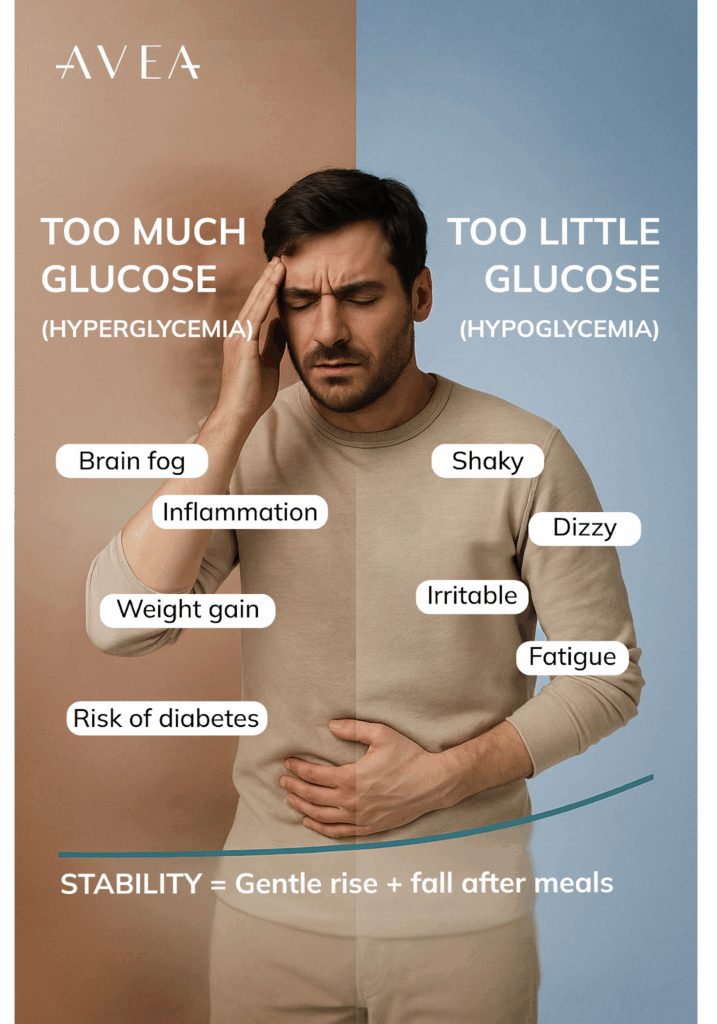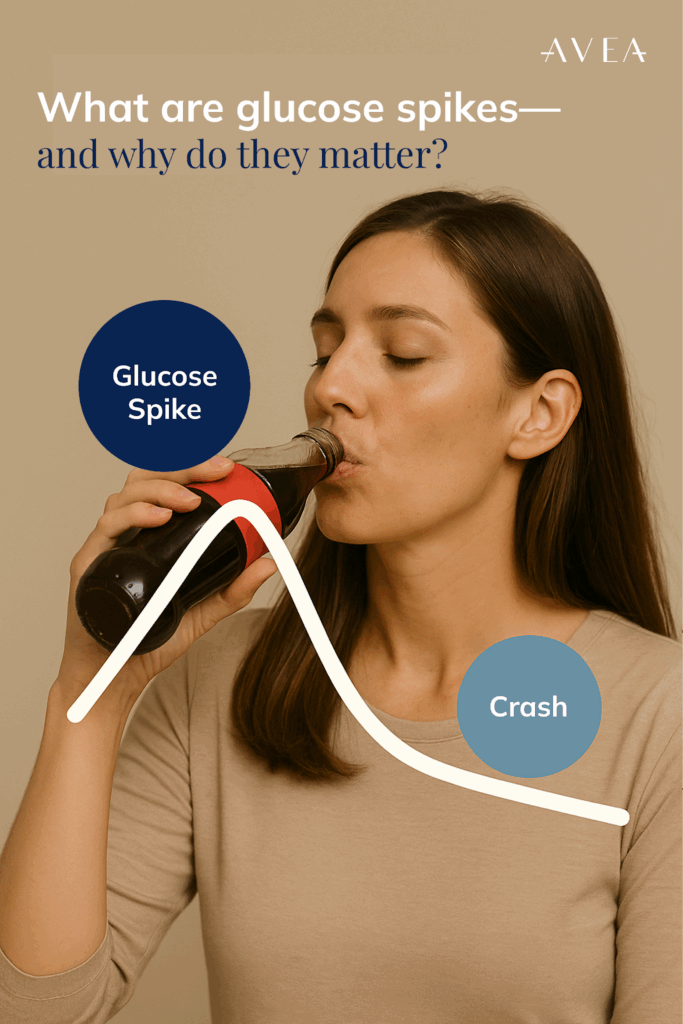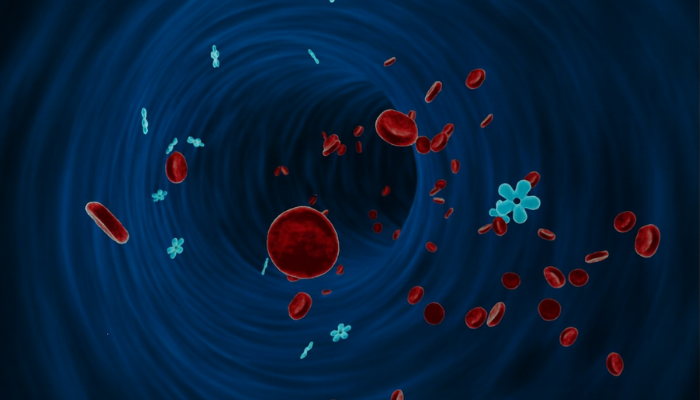Glucose often gets a bad rap in the world of health and wellness—but in reality, it’s one of the most essential substances in your body. It fuels your cells, powers your brain, and supports everything from exercise performance to hormone balance. The key lies in keeping it stable.
In this article, we break down what glucose is, how it works, what happens when it’s imbalanced, how it compares to other sugars, and how AVEA’s Stabiliser can help you regain control over your energy, metabolism, and long-term health.
In this article
What Is Glucose?
Glucose is a simple sugar—a type of carbohydrate—and the primary energy source for your body. When you eat foods containing carbohydrates—such as fruits, whole grains, vegetables, and even sweets—your digestive system breaks them down into glucose. This glucose enters your bloodstream and becomes available for your cells to use.
Your body either:
- Uses glucose immediately for energy, or
- Store it as glycogen in your muscles and liver for later use.
The process is tightly regulated by hormones, especially insulin, which allows glucose to enter your cells.
What’s the Difference Between Glucose, Fructose, Lactose, and Sucrose?
Understanding the different types of sugar helps clarify how they affect your body:
- Glucose: Found in many foods, especially starchy ones like bread and potatoes. It’s absorbed directly into the bloodstream and used as your main energy source.
- Fructose: Naturally found in fruit and honey. It’s metabolized primarily by the liver and does not raise blood glucose directly, but excess fructose can contribute to fat accumulation and insulin resistance.
- Sucrose (Table Sugar): A disaccharide made of 50% glucose and 50% fructose. Found in cane sugar, sweets, and processed foods. It breaks down into its components in the body.
- Lactose: A sugar found in dairy, composed of glucose and galactose. It’s broken down by the enzyme lactase. Some people have difficulty digesting lactose (lactose intolerance).

Each type of sugar behaves differently in the body, but ultimately, glucose is the most directly linked to blood sugar levels and energy regulation.
Why Is Glucose So Important?
Every cell in your body needs energy to function—and glucose is the most efficient fuel it can get. Glucose is especially critical for:
- Brain Function: Your brain uses more glucose than any other organ, accounting for about 20–25% of your energy needs.
- Muscle Activity: During physical activity, your muscles draw on both stored and circulating glucose.
- Hormone Regulation: Hormones like insulin, glucagon, and cortisol play central roles in glucose regulation.
- Cellular Energy Production: Glucose is converted into ATP (adenosine triphosphate) via cellular respiration, powering all your metabolic processes.
What Happens When Glucose Is Out of Balance?
Too Much Glucose (Hyperglycemia)
- You might feel tired after meals or experience brain fog.
- Over time, repeated glucose spikes can lead to insulin resistance, weight gain, inflammation, and increase your risk of metabolic disorders.
- Chronically high glucose is associated with type 2 diabetes, cardiovascular disease, and accelerated aging.
Too Little Glucose (Hypoglycemia)
- Can make you feel shaky, dizzy, irritable, or fatigued.
- Often caused by skipping meals, overexercising, or poor glucose regulation.
The healthiest scenario is glucose stability—a gentle rise and fall after meals, without sharp spikes or crashes.

What Are Glucose Spikes—and Why Do They Matter?
A glucose spike occurs when your blood sugar rises sharply after eating, especially after consuming high-carb or high-sugar meals. Your pancreas responds by releasing insulin, which helps shuttle that glucose into your cells.
But when spikes happen often, they’re followed by sharp drops—also known as glucose crashes. This rollercoaster can:
- Trigger fatigue, cravings, and irritability
- Disrupt hormone balance (including insulin, cortisol, and ghrelin)
- Promote fat storage, especially around the abdomen
- Increase inflammation and oxidative stress
Repeated spikes and crashes are one of the biggest contributors to:
- Weight gain
- Insulin resistance
- Mood instability
- Metabolic dysfunction
Keeping your glucose curve flatter and more stable is one of the smartest ways to support both daily wellbeing and long-term health.

What Affects Your Glucose Levels?
Several lifestyle and physiological factors can influence how your body manages glucose:
- Diet: Refined carbs, sugary drinks, and high-glycemic foods cause rapid spikes in blood sugar.
- Meal Timing & Composition: Eating protein, fiber, and healthy fats with carbs helps slow glucose absorption.
- Sleep: Poor or irregular sleep impairs insulin sensitivity.
- Stress: Cortisol (your stress hormone) can increase blood glucose by signaling the liver to release stored glycogen.
- Exercise: Physical activity improves your cells’ ability to use glucose effectively.
- Gut Health: Your microbiome influences glucose metabolism and insulin function.
Smart Lifestyle Tips to Balance Blood Sugar Naturally
While supplementation can be incredibly helpful, everyday habits make a big difference too. Here are a few simple, proven ways to support healthy glucose levels:
- Pair carbohydrates with protein and fat: This slows down the digestion and absorption of glucose, reducing spikes.
- Start meals with fiber or a salad: Fiber creates a barrier in the gut that delays glucose absorption.
- Walk or move after eating: Light physical activity, like a 10–20-minute walk, helps muscles use up circulating glucose.
- Avoid sugary drinks on an empty stomach: They can cause an immediate blood sugar surge.
- Eat at regular intervals: Skipping meals can lead to reactive hypoglycemia and cravings.
- Sleep well and manage stress: Both are critical for keeping insulin sensitivity intact.
Incorporating these small shifts into your routine can help flatten your glucose curve and improve how you feel throughout the day.
Why Glucose Stability Matters for Everyone
Glucose regulation isn’t just a concern for diabetics. Everyone can benefit from keeping their blood sugar more stable. Here’s why:
- Stable energy throughout the day without crashes
- Improved mood and focus, especially in the afternoon
- Fewer cravings and better appetite control
- Healthier aging, as glucose spikes are linked to oxidative stress and inflammation
- Reduced risk of long-term metabolic conditions
In fact, research shows that reducing glucose variability—not just average blood sugar—is one of the best ways to support longevity.
How AVEA’s Stabiliser Supports Healthy Glucose Levels

That’s where AVEA’s Stabiliser comes in. Designed for anyone who wants more energy, better metabolic health, and improved longevity, Stabiliser contains a clinically studied blend of three ingredients that help you take control of your glucose response—starting with your very next meal.
Key Ingredients:
- Reducose® (White Mulberry Leaf Extract): This plant-based compound inhibits alpha-glucosidase, an enzyme that breaks down complex carbs into glucose. As a result, it slows the release of glucose into the bloodstream, reducing post-meal spikes and improving metabolic response.
- Berberine: Known as one of the most powerful natural compounds for glucose regulation. It works similarly to metformin by activating AMPK, a key metabolic switch that helps your cells use glucose more efficiently. Berberine also enhances insulin sensitivity and supports lipid metabolism.
- Chromium Picolinate: This essential trace mineral improves your cells’ ability to respond to insulin, helping glucose enter the cells and reducing circulating blood sugar. It also plays a role in appetite regulation and carbohydrate metabolism.
Together, these ingredients help:
- Minimize post-meal glucose spikes
- Improve insulin function and glucose uptake
- Support balanced energy and mood
- Enhance digestion and reduce bloating
- Protect long-term metabolic health
Whether you’re eating out, having a carb-heavy meal, or simply looking for steadier energy, Stabiliser works in the background to smooth your glucose curve.
Glucose, Aging, and Longevity: The Bigger Picture
High glucose variability isn’t just about how you feel after lunch. It impacts how you age. Repeated glucose spikes contribute to:
- Inflammation
- Oxidative stress
- Glycation (which damages proteins, including collagen)
- Insulin resistance
All of which accelerate biological aging.
That’s why glucose regulation is emerging as one of the key pillars of longevity science. It’s not about extreme dieting or cutting all carbs—it’s about supporting your body to handle glucose better.
Final Thoughts
Glucose is not the enemy—it’s your fuel. But like any powerful energy source, it’s most effective when it’s stable and well-regulated.
By focusing on whole foods, sleep, movement, and smart supplementation with AVEA’s Stabiliser, you can flatten the glucose rollercoaster and enjoy better energy, better focus, and better long-term health.
The future of health isn’t just about how much glucose you have—it’s about how well you manage it.
Ready to take control of your glucose curve? Discover how AVEA Stabiliser can help you power through your day—without the crash.













